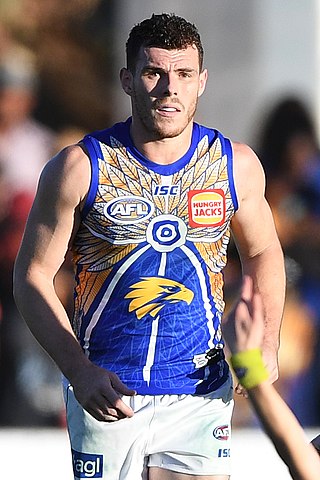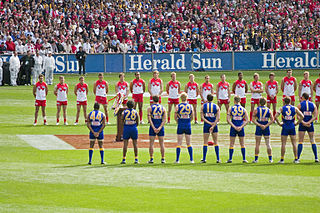
The Essendon Football Club, nicknamed the Bombers, is a professional Australian rules football club. The club plays in the Australian Football League (AFL), the game's premier competition. The club was formed by the McCracken family in their Ascot Vale home "Alisa", and while the exact date is unknown, it is generally accepted to have been in 1872. The club's first recorded game took place on 7 June 1873 against a Carlton seconds team. From 1878 until 1896, the club played in the Victorian Football Association (VFA), then joined seven other clubs in October 1896 to form the breakaway Victorian Football League. Headquartered at the Essendon Recreation Ground, known as Windy Hill, from 1922 to 2013, the club moved to The Hangar in Tullamarine in late 2013 on land owned by the Melbourne Airport corporation. The club shares its home games between Docklands Stadium and the Melbourne Cricket Ground. Zach Merrett is the current club captain.

The West Coast Eagles are a professional Australian rules football club based in Perth, Western Australia. The club was founded in 1986 as one of two expansion teams in the Australian Football League (AFL), then known as the Victorian Football League. The club plays its home games at Optus Stadium and has its headquarters at Lathlain Park. The West Australian Football Commission wholly owns the West Coast Eagles and the Fremantle Football Club, the AFL's other Western Australian team.

Guy Lindsay McKenna is a retired Australian rules football player and the former senior coach of the Gold Coast Football Club in the Australian Football League (AFL). McKenna played 267 games for the West Coast Eagles, including the 1992 and 1994 premiership wins. He captained the club between 1999 and 2000 AFL season.
Ken Judge was an Australian rules footballer and coach.
Stephen "Steve" Malaxos is a former Australian rules footballer and coach from Western Australia. While playing for Claremont in the WAFL, he won the 1984 Sandover Medal. Malaxos was an All-Australian with Claremont in 1986 and while he was with the West Coast Eagles in 1988. He was the inaugural fairest and best player at West Coast (1987), holds the Eagles' record for the most possessions in a game (48) and captained the club in 1990.
Toby Jason McGrath is an Australian rules footballer who played for South Fremantle in the West Australian Football League (WAFL). He was rookie-listed with both the West Coast Eagles and Essendon in the Australian Football League (AFL), but did not play a game for either club.

Justin Longmuir is a former Australian rules footballer who is the current senior coach of the Fremantle Football Club in the Australian Football League (AFL). Longmuir played for Fremantle between 1999 and 2007.
Adam Hunter is an Australian rules footballer who played for the West Coast Eagles in the Australian Football League (AFL). Hunter was born in Bunbury, Western Australia, and played with the South Bunbury Football Club in the West Australian Football League (WAFL) before being recruited to West Coast with the 29th pick overall in the 1999 National draft. Playing mainly in defence, though occasionally at centre half-forward, Hunter played a total of 151 games for the club between 2000 and 2009, including the 2006 premiership win.

Adam Simpson is a former Australian rules footballer who is the current coach of the West Coast Eagles in the Australian Football League (AFL), having led them to the 2018 premiership. A left-footed midfielder, his playing career for North Melbourne spanned from 1995 to 2009, where he played 306 games.
Peter Lori Sumich is a former Australian rules footballer who represented West Coast in the Australian Football League (AFL) and South Fremantle in the West Australian Football League (WAFL) during the 1980s and 1990s.
Robert John Wiley is a former Australian rules footballer who played for the Perth Football Club in the West Australian Football League (WAFL) and for the Richmond Football Club and West Coast Eagles in the Victorian Football League (VFL).

Luke Shuey is a former Australian rules footballer and former captain of the West Coast Eagles in the Australian Football League (AFL). He retired at the conclusion of the 2023 AFL season.
Peter Michael Worsfold is a former Australian rules footballer who played for the Brisbane Bears in the Australian Football League (AFL) during the early 1990s.
The 2011 AFL season was the 115th season of the Australian Football League (AFL), the highest level senior Australian rules football competition in Australia, which was known as the Victorian Football League until 1989.

Andrew Gaff is a professional Australian rules footballer playing for the West Coast Eagles in the Australian Football League (AFL). He plays predominantly as a midfielder.
The West Coast Eagles are an Australian rules football team based in Perth, Western Australia. Their 2011 season was their 25th season in the Australian Football League (AFL), their tenth season under premiership coach John Worsfold, and the fourth season with Darren Glass as captain. In the previous season, West Coast finished last on the ladder to receive their first wooden spoon. West Coast began their 2011 season with a four-point win over North Melbourne on 27 March. At the conclusion of round ten, West Coast had won five of their nine games and lost four, but over the remainder of the season won 12 of their 13 games to finish fourth at the end of the regular season. In the finals series, the club lost their qualifying final to Collingwood by 20 points. They defeated Carlton in a home semi-final, but lost to Geelong, the eventual premiers in a preliminary final at the MCG the following week.
Gerrick Peter Weedon is an Australian rules footballer who previously played with the Claremont Football Club in the West Australian Football League (WAFL) and the West Coast Eagles in the Australian Football League (AFL). Originally from the Kimberley region of Western Australia, Weedon moved to Perth to play for Claremont, before being recruited by West Coast with the 22nd pick overall in the 2009 National Draft, playing his first game for the club in round seven of the 2011 season. Due to his inability to break into West Coast's senior side, Weedon spent most of his time at the club playing in the WAFL, playing in Claremont's premiership sides in both 2011 and 2012. He was delisted from West Coast at the end of the 2012 season.

The West Coast Eagles is an Australian rules football club based in Perth, Western Australia, currently playing in the Australian Football League (AFL). The club was formed in 1986, and played its first season in the competition in 1987. Having lost the 1991 grand final to Hawthorn, the club won premierships in 1992 and 1994, becoming one of the most successful teams of the 1990s. West Coast won its third premiership in 2006, but declined afterwards, finishing last in 2010, before undergoing a rapid resurgence the following season to finish fourth in 2011.
The 2014 season was the West Coast Eagles' 28th season in the Australian Football League (AFL), the premier Australian rules football competition. The 2014 season also marks the first season of the club's reserves affiliation with the East Perth Football Club in the West Australian Football League (WAFL). West Coast finished thirteenth in the previous season, despite having made the finals in the two preceding seasons. At the end of the 2013 season, previous coach John Worsfold retired, after twelve seasons in the position, and was replaced by Adam Simpson, who had not coached previously at AFL level. Darren Glass was retained as captain for a seventh season, with Josh Kennedy and Scott Selwood as vice-captains. However, Glass retired from football after round 12, and was replaced by five acting co-captains: Shannon Hurn, Kennedy, Eric Mackenzie, Matt Priddis, and Selwood. Undefeated in the 2014 pre-season competition, West Coast started its season against the Western Bulldogs on 23 March. The club failed to qualify for the 2014 finals series, finishing its season in ninth place, with 11 wins and 11 losses. Priddis won the highest individual award, the Brownlow Medal, Beau Waters won the Jim Stynes Community Leadership Award, and Mackenzie was the club champion winning the John Worsfold Medal. No players from West Coast were selected on the All-Australian team.
The 2016 AFL season was the 120th season of the Australian Football League (AFL), the highest level senior Australian rules football competition in Australia, which was known as the Victorian Football League until 1989.








